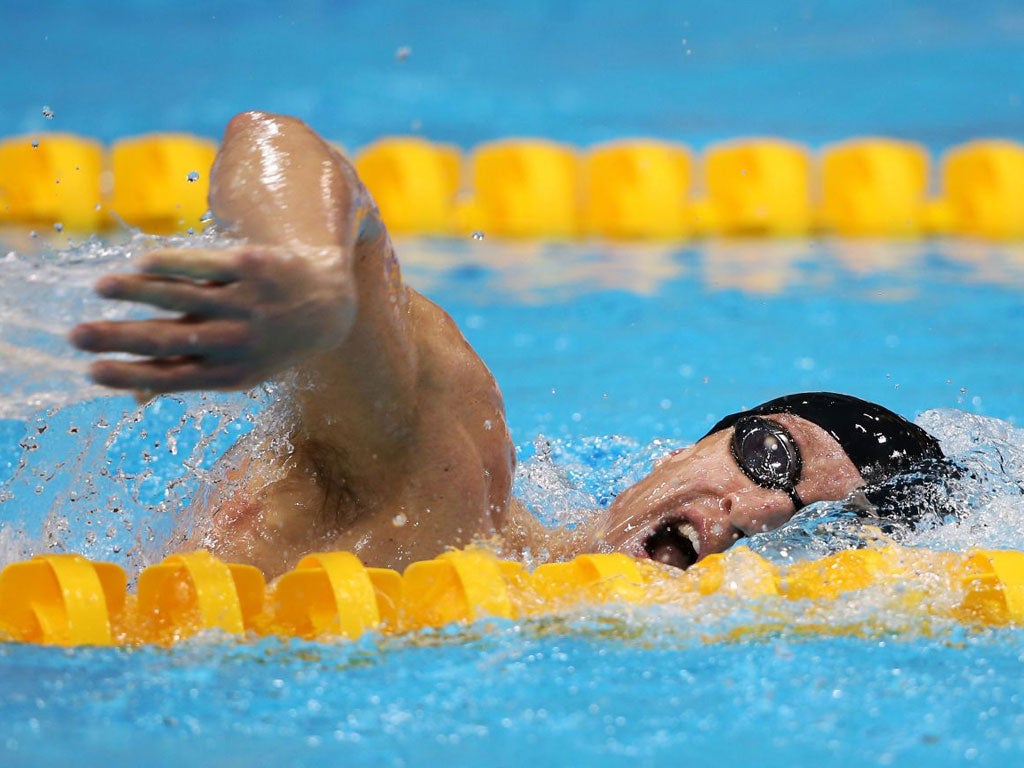Swimming: Snyder's year - from a Taliban bomb to double gold

Your support helps us to tell the story
From reproductive rights to climate change to Big Tech, The Independent is on the ground when the story is developing. Whether it's investigating the financials of Elon Musk's pro-Trump PAC or producing our latest documentary, 'The A Word', which shines a light on the American women fighting for reproductive rights, we know how important it is to parse out the facts from the messaging.
At such a critical moment in US history, we need reporters on the ground. Your donation allows us to keep sending journalists to speak to both sides of the story.
The Independent is trusted by Americans across the entire political spectrum. And unlike many other quality news outlets, we choose not to lock Americans out of our reporting and analysis with paywalls. We believe quality journalism should be available to everyone, paid for by those who can afford it.
Your support makes all the difference.It was a year ago yesterday that Bradley Snyder stepped on an explosive device the Taliban had secreted just beneath the surface of a farmer's field in Kandahar province. Last night he stepped on to the podium in the Aquatics Centre to receive his second Paralympic gold medal.
Snyder, a navy lieutenant, was fortunate not only to survive the blast but also to sustain no lasting damage to his limbs or torso. That his body was intact was the last thing he saw. For a few moments after the explosion he could see but his eyes had been shattered and his sight quickly faded. His eyeballs were so badly damaged that they had to be taken out during the three weeks he spent in intensive care in Florida and replaced with prosthetics. He is blind.
It was in the aftermath of the Second World War that the idea of the Paralympic Games began with Ludwig Guttmann, a specialist in treating spinal injuries at Stoke Mandeville Hospital, seeing it as a way to help heal some of the damage done to young servicemen. Snyder is the one of the first of a fresh wave of those injured in contemporary conflicts to find an outlet, a new life, via Guttmann's Games. The 28-year-old was a keen swimmer – he was captain of the swimming team at the US Naval Academy – but he only got back in the pool in February, swam the US trials in June and is now a double Paralympic champion. Last night he was led out on to poolside, stripped off and won his second gold medal by nearly six seconds from Spain's Enhamed Enhamed. It was a procession and one cheered on by his family and 10 of his former Navy colleagues.
"It's really an honour, it's really a privilege. The motto here is: 'Inspire a generation'. I suppose my generation is the wounded warriors," he said earlier this week. "It wasn't that long ago I was lying in the hospital bed. I know what they're going through. I know it's a tough blow, to have something removed from you, some kind of capability diminishment, and also to be taken out of the fight. Hopefully, my presence here, representing the flag in a different manner, can provide some inspiration to those guys so they can get out. It doesn't have to be sport but just get out of bed, get back into life and get through the barriers that have been presented to them."
There are 20 US servicemen in London for the Games through the Wounded Warrior programme and a handful of British veterans are competing too, including the cyclist Jon-Allan Butterworth, who lost an arm on active service in Basra in Iraq. Butterworth won three silver medals in the Velodrome.
There was to be no grand farewell for Natalie du Toit, one of the greats of the Paralympics. The South African was looking for a 14th gold medal from the final swim of her illustrious career. Instead she was usurped by an Australian seven years her junior who lists Du Toit as her inspiration. Hero worship clearly has its limits.
"I actually feel really bad about beating Natalie," said Ellie Cole. "I know I should feel really stoked, but it was her last race and I did want her to do really well."
Du Toit became the first disabled swimmer to compete in the Olympics when she finished 16th in the Beijing Games. She also reached the final of the 800m freestyle at the Manchester Commonwealth Games in 2002, just a year after the scooter accident which led to her left leg being amputated.
"Looking back, it's not inspiring [people], it's about showing people it is possible," said Du Toit. "Hopefully, people go out there and live life to the fullest, whether it be disabled people, old, young, whatever. Every day you can learn. I was always given the advice that the day you stop learning is the day that you will die."
Join our commenting forum
Join thought-provoking conversations, follow other Independent readers and see their replies
Comments